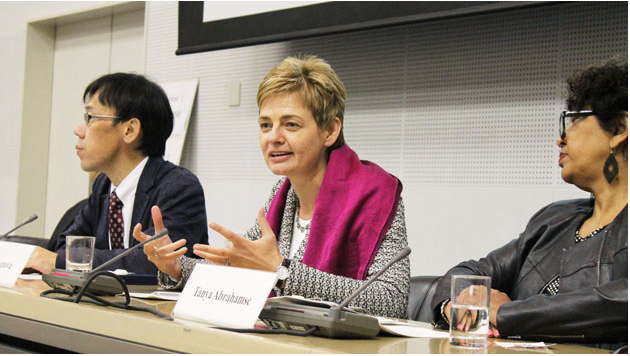2017-01-06

On 28 October 2016, in conjunction with its annual board meeting, UNU-IAS organized an SDG Dialogue on the topic A Sustainable Future for Africa. Approximately 100 participants, including researchers and African diplomats, discussed the challenges and opportunities facing Africa as it pursues a more sustainable future, including how to implement the 2030 Agenda for Sustainable Development and achieve its 17 SDGs, as well as the African Union’s Agenda 2063.
The event began with keynote speeches from two UNU-IAS board members, Tanya Abrahamse (Chief Executive Officer of the South African National Biodiversity Institute) and Maria Ivanova (Associate Professor of Global Governance at the University of Massachusetts Boston). In discussing factors for sustainability for Africa, Dr. Abrahamse highlighted that for Africa to implement the 2030 Agenda, there is a need for a sweeping paradigm shift. She said that such a change should include adopting a sustainable management approach towards natural capital and increasing intergovernmental cooperation to improve and coordinate policy responses. She also emphasized the importance of international partners supporting African states to prioritize their own development agendas in line with global initiatives, rather than dictating policy for them to adopt and implement.
In discussing Africa’s progress on the global goals, Prof. Ivanova observed that Africa’s implementation of international environmental agreements was close to the global average, referring to the Ramsar Convention and the Basel Convention on Movement of Hazardous Waste. This has been confirmed through her work with colleagues at the John W. McCormack Graduate School of Policy and Global Studies, University of Massachusetts Boston, to create an Environmental Conventions Index.
Building on the speeches, three more presentations focused on enhancing resilience against climate and ecosystem changes in sub-Saharan Africa (Osamu Saito), youth entrepreneurship for sustainable industrialization (Emmanuel Mutiysa), and the role of Africa’s private sector in natural resources management (Linda Chinangwa). During a panel discussion with questions from the audience, emphasis was placed on the need for greater support for a self-reliant and forward-looking Africa.